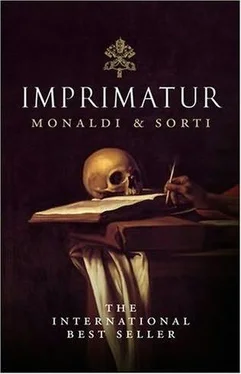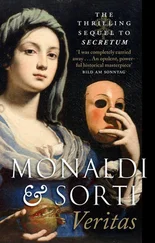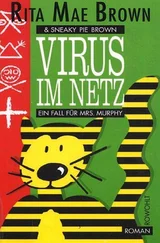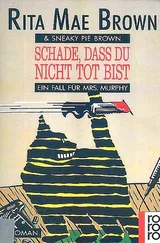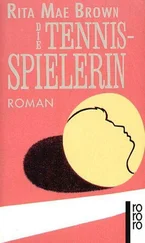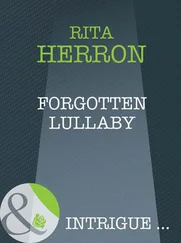Rita Monaldi - Imprimatur
Здесь есть возможность читать онлайн «Rita Monaldi - Imprimatur» весь текст электронной книги совершенно бесплатно (целиком полную версию без сокращений). В некоторых случаях можно слушать аудио, скачать через торрент в формате fb2 и присутствует краткое содержание. Жанр: Исторический детектив, на английском языке. Описание произведения, (предисловие) а так же отзывы посетителей доступны на портале библиотеки ЛибКат.
- Название:Imprimatur
- Автор:
- Жанр:
- Год:неизвестен
- ISBN:нет данных
- Рейтинг книги:5 / 5. Голосов: 1
-
Избранное:Добавить в избранное
- Отзывы:
-
Ваша оценка:
- 100
- 1
- 2
- 3
- 4
- 5
Imprimatur: краткое содержание, описание и аннотация
Предлагаем к чтению аннотацию, описание, краткое содержание или предисловие (зависит от того, что написал сам автор книги «Imprimatur»). Если вы не нашли необходимую информацию о книге — напишите в комментариях, мы постараемся отыскать её.
Imprimatur — читать онлайн бесплатно полную книгу (весь текст) целиком
Ниже представлен текст книги, разбитый по страницам. Система сохранения места последней прочитанной страницы, позволяет с удобством читать онлайн бесплатно книгу «Imprimatur», без необходимости каждый раз заново искать на чём Вы остановились. Поставьте закладку, и сможете в любой момент перейти на страницу, на которой закончили чтение.
Интервал:
Закладка:
I put these in my pocket and headed for the chamber in which Signor di Mourai had died. There, I found three of our guests engaged in the saddest of tasks. Cristofano was carrying the corpse of the deceased, wrapped in a white cloth which served as a shroud, and beneath which one could sense the deathly rigour of his members. The physician was assisted by Signor Pellegrino and, in the absence of younger volunteers, by Dulcibeni and Atto Melani. The abbot wore no periwig, neither was his face powdered. I was astonished to see him wearing secular apparel-taffeta breeches and a muslin cravat-which seemed excessively elegant for so sombre an occasion. The only remaining sign of his rank was a pair of fiery red stockings.
The poor body was placed on a large oblong basket, lined with rags and blankets. On top of it was placed the bundle containing his few effects, collected by Dulcibeni.
"Did he possess nothing else?" asked Abbot Melani, noticing that the gentleman from Fermo had packed only a few of the dead man's clothes.
Cristofano replied that it was only obligatory to hand over clothing. Other effects could remain in the hands of Dulcibeni, who could deliver them to any surviving relatives. Then the three lowered the corpse with a thick rope through the window down to the street, where the Societas Orationis et Mortis awaited their sad consignment.
"What will they do with the body, Signor Cristofano?" I asked the physician. "Is it true that they will burn it?"
"That is not our business. It is not possible to bury him," he added, drawing breath.
We heard a slight tinkling. Cristofano reached down to the ground. "Did you drop something?… but what have you in your hand?" he asked.
From my half-open hand one of the pearls, with which I had been nervously playing, had fallen to the floor. The doctor picked it up and studied it.
"Really splendid. Where did you get it?"
"Oh, these were deposited by a customer," I lied, showing him the other two.
My master, in the meantime, left the apartment. He seemed tired. Atto, too, departed in the direction of his own apartment.
"That is bad. One should never allow oneself to be parted from pearls, least of all in our predicament."
"Why?"
"Among their numerous and occult virtues, they preserve one from poison."
"How is that possible?" I asked, growing pale.
"Because they are siccae and frigidae to the second degree," replied Cristofano, "and, if well preserved in a vase and not perforated, habent detergentem facultatem, and can exercise a cleansing action in the presence of fevers and putrefaction. They purge and clarify the blood- indeed, they limit menstruation-and, according to Avicenna, they cure the corpum crassatum, palpitations and cardiac syncope."
While Cristofano was displaying his medical learning, I felt unable to comprehend: what obscure signal did Brenozzi's gift hide? I knew that I must absolutely speak of this with Abbot Melani, and I sought to take my leave of the chirurgeon.
"Interesting," added Cristofano, examining the pearls and turning them attentively with his fingertips. "The form of these pearls indicates that they were fished before the full moon and in evening waters."
"And what does that mean?"
"That they cure the false imaginings of the soul and cogitations. Dissolved in vinegar, they are a sure remedy for omni imbecillitate et animideliquio, above all, for apparent death."
At last Cristofano returned the pearls to me and I was able to leave him. I ran straight up the stairs to Abbot Melani's apartment.
Atto's chamber was on the second floor, just above that which the old Mourai had shared with Dulcibeni. These were the largest and brightest apartments in the entire hostelry: each had three windows, two of which faced onto the Via dell'Orso and one onto the corner of the alleyway. In the days of Signora Luigia, important personages had lodged there with their retinue. There was also an identical room on the third and last floor, under the eaves, where Signora Luigia had lived. Here, despite Cristofano's prohibition, my master and I continued to cohabit, although temporarily: this being a privilege that I would surely lose on the return of Signor Pellegrino's wife, when I would again be relegated to sleeping in the kitchen.
I was struck by the variety of books and maps of all sorts which the abbot had brought with him. Atto Melani was a lover of the antiquities and beauties of Rome, judging, at least, by the titles of some of the volumes which I glimpsed, carefully arranged on a shelf, and with which I was later to acquaint myself in quite another manner:
The Splendour of ancient and modern Rome, in which are represented all the principal Temples, Theatres, Amphitheatres, Circuses, Naumachiae, Triumphal Arches, Obelisks, Palaces, Baths, Curiae and Basilicas, by Lauri; and Fabricius' Chemnicensis Roma and The Antiquities of Rome in a Compendium of Authors both Ancient and Modern, together with a Treatise concerning the Fires of the Ancients by Andrea Palladio. Nine great maps stood out, with their rods the colour of Indian cane and gold pommels, together with a mass of manuscript letters which Melani was sorting on the table and which he quickly put down. He offered me a seat.
"I wanted to talk to you. Tell me: have you any acquaintances in this quarter? Friends, confidants?"
"I think… well, no. Almost no one, Signor Abbot Melani."
"You may call me Signor Atto. A pity. I would like to have known, at least through the window, what is being said about our plight; and you were my only hope," he said.
He went to the window and began to sing in an exceedingly suave voice, which he barely restrained:
Disperate speranze, addio, addio.
Ahi, mentite speranze, andate a volo…'*
The abbot's extemporaneous assay of virtuosity left me stupefied and full of admiration. Despite his age, Melani still possessed a rather light soprano voice. I complimented him and asked him if he had composed the splendid cantata of which he had just sung a snatch.
"No, 'tis by Seigneur Luigi Rossi, my master," he replied distractedly. "But tell me rather, tell me: how did the morning go? Have you noticed anything bizarre?"
"A rather strange episode befell me, Signor Atto. I had only just had a conversation with Signor Devize when…"
"Ah, Devize, it was precisely about him that I wished to talk to you. Was he playing?"
"Yes, but…"
"He is good. The King appreciates him greatly. His Majesty adores the guitar almost as much as, once, when young, he adored opera and giving a good account of himself in the court ballets. Fine times… And what did Devize say to you?"
I understood that, unless I first exhausted the matter of music, he would not allow me to proceed further with my account. I told him of the rondeau which I had heard from the French musician's guitar, and how the latter had spoken to me of the music he had heard in many Italian theatres, above all in Venice, with its celebrated Teatro del Cocomero. [1]
"The Teatro del Gocomero? Are you sure that you remember that properly?"
"Well, yes… the Watermelon… It is such a strange name for a theatre. Devize told me he had been there just before he travelled to Naples. Why?"
"Oh nothing. It is just that your guitarist is telling tall tales, but he has not taken the trouble to prepare them well."
I was dumbfounded. "How can you tell?"
"The Cocomero is a magnificent theatre, where many splendid virtuosi do indeed perform. To tell the truth, I have sung there myself. I remember that, once, the organiser wished me to play the part of Apelles in Alessandro, Vincitore di Se Stesso. I of course refused and they gave me the main role, ha ha! A truly fine theatre, the Cocomero. A pity that it is in Florence and not in Venice."
"But… Devize said he had been there before going to Naples."
Читать дальшеИнтервал:
Закладка:
Похожие книги на «Imprimatur»
Представляем Вашему вниманию похожие книги на «Imprimatur» списком для выбора. Мы отобрали схожую по названию и смыслу литературу в надежде предоставить читателям больше вариантов отыскать новые, интересные, ещё непрочитанные произведения.
Обсуждение, отзывы о книге «Imprimatur» и просто собственные мнения читателей. Оставьте ваши комментарии, напишите, что Вы думаете о произведении, его смысле или главных героях. Укажите что конкретно понравилось, а что нет, и почему Вы так считаете.
